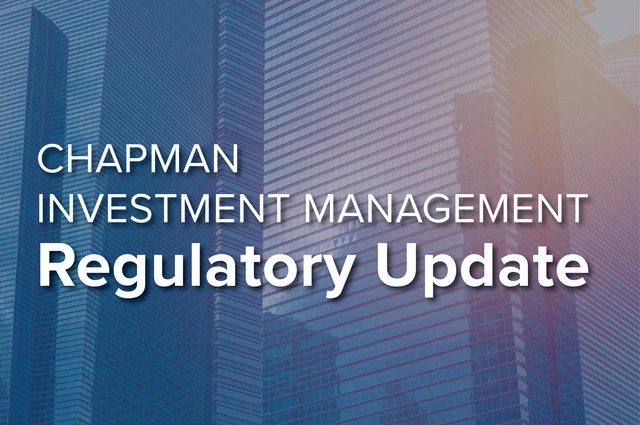- Topic: Investment Advisers Act of 1940
33 matches.
Chapman's white paper provides a summary of the interval fund and tender offer fund structures, including their basic legal framework, their investment restrictions, how they are distributed and how they facilitate redemptions. It also provides a comparison of interval funds and tender offer funds, both to each other and to other types of investment companies.
The Investment Advisers Act of 1940 (the “Advisers Act”), rules adopted by the U.S. Securities and Exchange Commission (the “SEC”) pursuant thereto, and state laws governing the activities of investment advisers determine when persons engaged in the business of providing investment advice must or may register as an investment adviser with either the SEC or the relevant state authorities.
On June 5, 2024, the United States Court of Appeals for the Fifth Circuit (the “Court”) determined to vacate rules recently adopted by the Securities and Exchange Commission (the “Commission”) regulating the conduct of investment advisers to private investment funds (the “Private Fund Advisers Rule”).
On February 15, 2023, by a vote of 4 to 1 with only Commissioner Peirce voting no, the U.S. Securities and Exchange Commission proposed to amend the content of Rule 206(4)-2 under the Investment Advisers Act of 1940 (the “Advisers Act”), known as the Custody Rule, and redesignate it as Rule 223-1 under the Advisers Act, now known as the Safeguarding Rule. If adopted, the proposal would, among other things, expand the coverage of the Advisers Act’s custody provisions beyond “client funds and securities” to include any client assets of which an adviser has custody, a change that would bring within the rule’s coverage all digital assets, including non-securities such as commodities. Such a change would impose a requirement on many investment advisers that hold client assets to place those assets with a “qualified custodian,” despite a current lack of widespread availability of such service providers for many digital assets.
On February 9, 2022, the Securities and Exchange Commission (the “Commission”) voted 3 to 1 to propose new and amended rules under the Investment Advisers Act of 1940 (the “Advisers Act”) to require advisers to private funds to provide additional disclosures to investors in such funds, prohibit certain types of preferential treatment to investors and impose new requirements related to fund audits, books and records and adviser-led secondary transactions.
On December 22, the U.S. Securities and Exchange Commission adopted amended Rule 206(4)‑1 under the Investment Advisers Act of 1940, as amended, which addresses investment advisers marketing their services to clients and investors
On November 25, the SEC re-proposed Rule 18f-4 under the Investment Company Act of 1940 as amended. Rule 18f-4 is intended to be a new exemptive rule that is designed to enhance the regulation of the use of derivatives by registered investment companies, including mutual funds, ETFs, closed-end funds, and BDCs notwithstanding the restrictions under the 1940 Act.
On November 4, the SEC announced proposed amendments to Rules 206(4)-1 and 206(4)-3 under the Investment Advisers Act of 1940 to address investment adviser advertisements and payments to solicitors, respectively.
- Fall 2019Journal of Investment Compliance
Fund sponsors are increasingly considering two similar types of registered closed-end investment companies known as “interval funds” and “tender offer funds” as an attractive alternative to open-end mutual funds, ETFs and traditional closed-end funds.
The Securities and Exchange Commission voted 3 to 1 to adopt highly anticipated new and amended rules, forms and guidance relating to registered investment advisers’ and broker-dealers’ conduct and interactions with retail customers.
On December 14, the Securities and Exchange Commission’s Office of Compliance Inspections and Examinations issued a Risk Alert reminding investment advisers of their recordkeeping obligations with respect to electronic messaging and summarizing their related observations from recent examinations.
On June 28, the Securities and Exchange Commission proposed Rule 6c-11 under the Investment Company Act of 1940 and amendments to Form N-1A and Form N-8B-2 that overhaul the patchwork regulatory framework that currently governs the $3.4 trillion ETF industry.
The Securities and Exchange Commission’s Office of Compliance Inspections and Examinations recently published a Risk Alert that highlights frequently-identified investment adviser fee and expense compliance issues from exams of over 1,500 investment adviser examinations during the past two years.
The beginning of each year provides an opportunity for investment advisers to review compliance and regulatory matters, including issues related to private investment funds and commodity pools, which are briefly summarized in this alert.
- Q3 2017 (Originally Published May 4, 2017)Journal of Investment Compliance
The Financial Industry Regulatory Authority, Inc. released additional guidance on social media and digital communications in Regulatory Notice 17-18. The guidance from FINRA is summarized in this article.
The Securities and Exchange Commission’s Office of Compliance Inspections and Examinations recently published a Risk Alert that highlights frequently identified investment adviser advertising compliance issues. The Risk Alert identifies the advertising compliance issues most frequently identified in deficiency letters from investment adviser examinations.
- Q2 2017 (Originally Published February 24, 2017)Journal of Investment Compliance
In February 2017, the staff of the Securities and Exchange Commission’s Division of Investment Management issued guidance providing additional clarity on Rule 206(4)-2 under the Investment Advisers Act of 1940.
The Financial Industry Regulatory Authority, Inc. recently released additional guidance on social media and digital communications. FINRA previously issued guidance on the use of social media communications in Regulatory Notice 10-06 and Regulatory Notice 11-39.
The staff of the Securities and Exchange Commission’s Division of Investment Management recently issued new guidance providing additional clarity on Rule 206(4)-2 under the Investment Advisers Act of 1940.
The Financial Industry Regulatory Authority, Inc. recently proposed amendments that would create a new exception to FINRA’s prohibition on projecting performance. The proposed exception to FINRA Rule 2210 would permit a firm to distribute a customized hypothetical investment planning illustration.
The Securities and Exchange Commission’s Office of Compliance Inspections and Examinations recently published a Risk Alert listing five compliance topics most frequently identified in deficiency letters to investment advisers following exams.
The beginning of each year provides an opportunity for investment advisers to review annual compliance and regulatory matters, including issues related to private investment funds and commodity pools. This alert briefly summarizes some of the primary issues that advisers might consider in their 2017 annual review and update processes.
The Securities and Exchange Commission recently approved new Financial Industry Regulatory Authority, Inc. pay‑to-play rules to regulate activities of FINRA member firms that engage in distribution or solicitation activities with government entities on behalf of investment advisers.
The Securities and Exchange Commission recently adopted changes to certain aspects of the reporting, disclosure and recordkeeping obligations of registered investment advisers including changes to Form ADV.
The Securities and Exchange Commission recently proposed a new rule and rule amendments under the Investment Advisers Act of 1940 that would require SEC-registered investment advisers to adopt and implement written business continuity and transition plans.
- CCH Global Tax Weekly
UCITS are a type of collective investment vehicle and they may be difficult to fit into existing tax and regulatory schemes. Although UCITS were developed to facilitate cross-border investments, the model U.S. and OECD treaties are only recently beginning to effectively address collective investment vehicles.
The Securities and Exchange Commission recently published a notice of its intention to adjust for inflation dollar amount thresholds for the “qualified client” definition under Investment Advisers Act of 1940 Rule 205-3. Under Rule 205-3, an investment adviser may charge performance-based fees to a “qualified client” meeting a minimum net worth or minimum assets.
The Financial Industry Regulatory Authority recently filed with the Securities and Exchange Commission a revised proposal to establish “pay-to-play” rules that would regulate certain activities of FINRA member firms. The revised proposal responds to comments made on a previous FINRA proposal.
- Client Alert
The Securities and Exchange Commission recently set the compliance date for the ban on certain payments to third-party solicitors under Rule 206(4)-5 of the Investment Advisers Act of 1940 as July 31, 2015.
- Client Alert
The staff of the Securities and Exchange Commission’s Division of Investment Management recently published guidance on investment adviser Code of Ethics exceptions to personal securities transaction reporting for securities transactions occurring in certain types of trusts or investment management accounts where the beneficiary or account holder has limited or no discretionary investment authority.
- Client Alert
This Client Alert summarizes the Securities and Exchange Commission proposed changes to certain aspects of the reporting, disclosure, and recordkeeping obligations of registered investment advisers.
- Client Alert
The Financial Industry Regulatory Authority recently issued an interpretive letter that allows distributors of mutual funds to include related performance information in communications with institutional investors, including registered broker-dealers and investment advisers.
- Client Alert
On May 20, 2015, the Securities and Exchange Commission proposed changes to certain aspects of reporting and disclosure obligations of registered investment advisers and investment companies.









